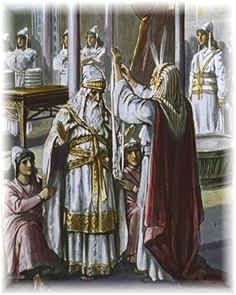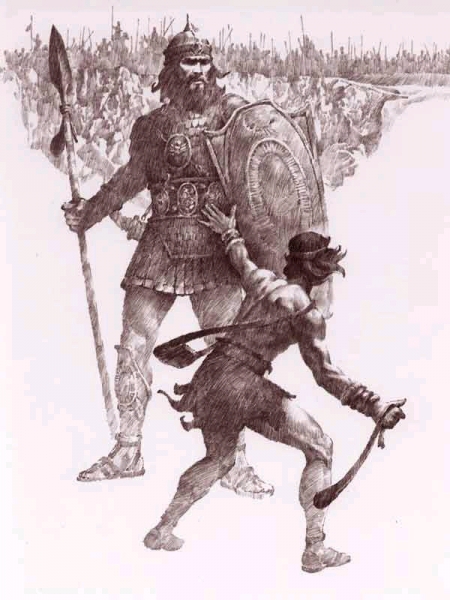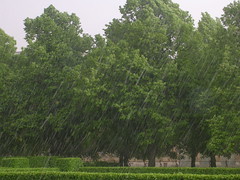2008-12-19
2008-12-04
Adams on Psalm 141:2 & 147:3
Labels: C H Spurgeon, Psalms, Quotations 0 comments
Adams on Psalm 139:14
Labels: C H Spurgeon, Psalms, Quotations 0 comments
2008-12-01
Adams on Psalm 133:2, 135:6 & 137:8
Labels: C H Spurgeon, Psalms, Quotations 0 comments
2008-11-28
Adams on Psalm 128:3 & 130:4
Labels: C H Spurgeon, Psalms, Quotations 0 comments
2008-10-13
Adams on Psalm 126:5
Labels: C H Spurgeon, Psalms, Quotations 0 comments
2008-09-20
Adams on Psalm 124:7 & 125:3, 4
Labels: C H Spurgeon, Psalms, Quotations 0 comments
2008-09-08
Adams on Psalm 119:4, 5, 51, 136, 162
Labels: C H Spurgeon, Psalms, Quotations 0 comments
Adams on Psalm 116:16
Labels: C H Spurgeon, Psalms, Quotations 0 comments
2008-07-30
Adams on Psalm 109:10-13, 16
Labels: C H Spurgeon, Psalms, Quotations 0 comments
2008-07-23
Adams on Psalm 106:6,13,15
1. Grossness; which takes away agility to any good work; which makes a man more like a tun upon two pottle pots. Caesar said he mistrusted not Antony and Dolabella for any practices, because they were fat; but Casca and Cassius, lean, hollow fellows, who did think too much. The other are the devil's crammed fowls, too fat to lay. Indeed, what need they travel far, whose felicity is at home; placing paradise in their throats, and heaven in their food?
2. Macilency (leanness) of grace; for as it puts fatness into their bodies, so leanness into their souls. God fatted the Israelites with quails, but withal sent leanness into their soul. The flesh is blown up, the spirit doth languish. They are worse than man eaters, for they are self eaters: they put a pleurisy into their bloods, and an apoplexy into their souls.
Labels: C H Spurgeon, Psalms, Quotations 0 comments
Adams on conversion as a miracle
Labels: Conversion, miracles, Quotations 0 comments
2008-07-21
Adams on Psalm 105:17
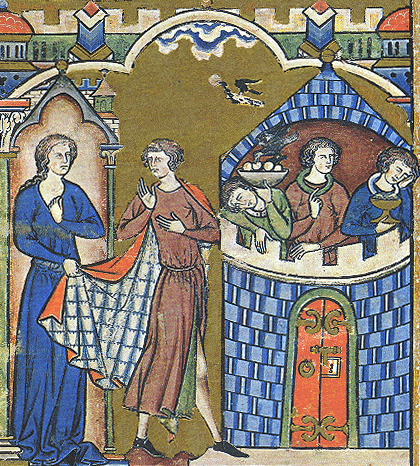 Joseph may be a fit type to us of our spiritual deliverance. Consider him sold into Egypt, not without the determinate counsel of God, who preordained this to good; "God did send me before you to preserve life," Gen 45:5. Here is the difference, the brethren sold Joseph, we sold ourselves. Consider us thus sold unto sin and death; God had a purpose to redeem us; there is election. Joseph was delivered out of prison, and we ransomed out of the house of bondage; there was redemption. Joseph's cause was made known, and himself acquitted; we could not be found innocent ourselves, but were acquitted in Christ; wherein consists our justification. Lastly, Joseph was clothed in glorious apparel, and adorned with golden chains, and made to ride in the second chariot of Egypt: so our last step is to be advanced to high honour, even the glory of the celestial court; "This honour have all the saints, " Ps 149:9.
Joseph may be a fit type to us of our spiritual deliverance. Consider him sold into Egypt, not without the determinate counsel of God, who preordained this to good; "God did send me before you to preserve life," Gen 45:5. Here is the difference, the brethren sold Joseph, we sold ourselves. Consider us thus sold unto sin and death; God had a purpose to redeem us; there is election. Joseph was delivered out of prison, and we ransomed out of the house of bondage; there was redemption. Joseph's cause was made known, and himself acquitted; we could not be found innocent ourselves, but were acquitted in Christ; wherein consists our justification. Lastly, Joseph was clothed in glorious apparel, and adorned with golden chains, and made to ride in the second chariot of Egypt: so our last step is to be advanced to high honour, even the glory of the celestial court; "This honour have all the saints, " Ps 149:9.Labels: C H Spurgeon, Psalms, Quotations 0 comments
2008-07-18
Adams on Psalm 103:13, 14, 19
 13, 14. The good father doth not turn off the child for being weak and sickly; but is so much the more indulgent as his necessity requires succour. If his stomach refuse meat, or cannot answer it with digestion, will he put him out of doors? No; when the Shunamite's son complains of his head, she lays him in her bosom. A mother is good to all the fruit of her womb, most kind to the sick infant: when it lies with its eyes fixed on her, not able to declare its grief, or to call for what it desires, this doubles her compassion: "So the Lord doth pity us, remembering our frame, considering that we are but dust"; that our soul works by a lame instrument; and therefore he requires not that of an elemental composition, which he doth of angelical spirits. The son is commanded to write out such a copy fairly; he doth his best, far short of the original; yet the father doth not chide, but encourage him. Or he gives him a bow and arrows, bids him shoot to such a mark; he draws his utmost strength, lets go cheerfully: the arrow drops far short, yet the son is praised, the father pleased. Temptation assaults us, lust buffets us, secular business diverts us, manifold is our weakness, but not beyond our Father's forgiveness: "He will spare us, as a man spareth his own son that serveth him," Mal 3:17.
13, 14. The good father doth not turn off the child for being weak and sickly; but is so much the more indulgent as his necessity requires succour. If his stomach refuse meat, or cannot answer it with digestion, will he put him out of doors? No; when the Shunamite's son complains of his head, she lays him in her bosom. A mother is good to all the fruit of her womb, most kind to the sick infant: when it lies with its eyes fixed on her, not able to declare its grief, or to call for what it desires, this doubles her compassion: "So the Lord doth pity us, remembering our frame, considering that we are but dust"; that our soul works by a lame instrument; and therefore he requires not that of an elemental composition, which he doth of angelical spirits. The son is commanded to write out such a copy fairly; he doth his best, far short of the original; yet the father doth not chide, but encourage him. Or he gives him a bow and arrows, bids him shoot to such a mark; he draws his utmost strength, lets go cheerfully: the arrow drops far short, yet the son is praised, the father pleased. Temptation assaults us, lust buffets us, secular business diverts us, manifold is our weakness, but not beyond our Father's forgiveness: "He will spare us, as a man spareth his own son that serveth him," Mal 3:17. Secondly, over all places, heaven, earth, hell, Ps 135:6. Kings are limited, and cannot do many things they desire: they cannot command the sun to stand still, nor the wind to blow which way they would: in the lofty air, in the depths of the sea no king reigns. They fondly flatter the pope with his long arms that they reach to purgatory; (but indeed both power and place are alike imaginary;) it is Christ alone that hath the keys of all places.
Thirdly, over all creatures; binding the influences of Pleiades, and loosing the bands of Orion, Job 38:31; commanding the fire against the nature of it, to descend, 2 Kings 1:12; creating and ruling the stars, Am 5:8; overruling the lions, Dan 6:22, sending the meteors, Ps 148:8, hedging in the sea, lapping it up like a child in swaddling-clothes, Job 38:8, dividing, diverting, filling it. In both fire and water, those two raging elements that have no mercy, he shows mercy; delivers us from both in both. He calls the fowls, and they come; the beasts, and they hear: the trees, and they spring to obey him. He hath a raven for Elijah, a gourd for Jonah, a dog for Lazarus. Makes the leviathan, the hugest living creature, preserve his prophet. That a terrible lion should be killed, as was by Samson; or not kill, as they forbore Daniel; or kill and not eat, as that prophet, 1 Kings 13:1-29: here was the Lord. Over metals; he makes iron to swim, stones to cleave asunder. Over the devils; they must obey him though unwillingly. But they continually rebel against him, and break his will? They do indeed against his complacency, not against his permission. There is then no time, not the hour of death; no place, not the sorest torment; no creature, not the devil; but the Lord can deliver us from them. Therefore at all times, in all places, and against all creatures, let us trust in him for deliverance.
Labels: C H Spurgeon, Psalms, Quotations 0 comments
2008-07-16
Adams on Psalm 99:1 & 102:26
 99:1 Holy arm. The creation was the work of God's fingers: "When I consider thy heavens, the work of thy fingers," Ps 8:3; redemption a work of his arm, "His holy arm hath gotten him the victory"; yea, it was a work of his heart, even that bled to death to accomplish it.
99:1 Holy arm. The creation was the work of God's fingers: "When I consider thy heavens, the work of thy fingers," Ps 8:3; redemption a work of his arm, "His holy arm hath gotten him the victory"; yea, it was a work of his heart, even that bled to death to accomplish it.Labels: C H Spurgeon, Psalms, Quotations 0 comments
2008-07-10
Works of Adams available
The works of Adams in three volumes are currently available from Reformation Heritage. See here.
Labels: Joel Beeke, Link, Reformation Heritage, Works 0 comments
2008-07-07
Adams on Psalm 94:19
Labels: C H Spurgeon, Psalms, Quotations 0 comments
2008-07-01
Adams on Psalm 91:11
Labels: C H Spurgeon, Psalms, Quotations 0 comments
2008-06-30
Adams on Psalm 90:10
Labels: C H Spurgeon, Psalms, Quotations 0 comments
2008-06-28
Adams on Psalm 86:13 & 16
Labels: C H Spurgeon, Psalms, Quotations 0 comments
2008-06-23
Adams on Psalm 84:11 & 85:8
 85:8 I will hear, etc The eye as a mere organ of sense must give place to the ear. Therefore it is wittily observed, that our Saviour commanding the abscession of the offending hand, foot and eye, (Mr 9:43-47), yet never spake of the ear. If thy hand, thy foot or thine eye, cause thee to offend, deprive thyself of them; but part not with thine ear, for that is an organ to derive unto thy soul's salvation. As Christ says there, a man may enter into heaven, lamed in his feet, as Mephibosheth, blind in his sight, as Barzillai, maimed in his hand, as the dry handed man in the gospel; but if there be not an ear to hear of the way, there will be no foot to enter into heaven. If God be not first in the ear, he is neither sanctifiedly in the mouth, nor comfortably in the heart. The Jews had eyes to see Christ's miracles, but because they had no ears to hear his wisdom, therefore they had no feet to enter into his kingdom. The way into the house is by the door, not by the window: the eye is but the window of the heart, the ear is the door. Now Christ stands knocking at the door, not at the window. Re 3:20. And he will not come in at the window, but at the door. "He that entereth in by the door is the shepherd of the sheep." Joh 10:2. He comes now in by his oracles, now by his miracles. "To him the porter openeth; and the sheep hear his voice" Joh 10:3. The way to open and let him in is by the door; to hear his voice. There was a man in the gospel blind and deaf; blind eyes is ill; but deaf ears, worse. It is bad to have the eyes seeled (Seel, to close up: a term in falconry), but worse to have the ears sealed up. Open your ears therefore to this heavenly voice. Bernard hath this description of a good ear: Which willingly hears what is taught, wisely understands what it heareth, and obediently practises what it understandeth. O give me such an ear, and I will hang on it jewels of gold, ornaments of praise.
85:8 I will hear, etc The eye as a mere organ of sense must give place to the ear. Therefore it is wittily observed, that our Saviour commanding the abscession of the offending hand, foot and eye, (Mr 9:43-47), yet never spake of the ear. If thy hand, thy foot or thine eye, cause thee to offend, deprive thyself of them; but part not with thine ear, for that is an organ to derive unto thy soul's salvation. As Christ says there, a man may enter into heaven, lamed in his feet, as Mephibosheth, blind in his sight, as Barzillai, maimed in his hand, as the dry handed man in the gospel; but if there be not an ear to hear of the way, there will be no foot to enter into heaven. If God be not first in the ear, he is neither sanctifiedly in the mouth, nor comfortably in the heart. The Jews had eyes to see Christ's miracles, but because they had no ears to hear his wisdom, therefore they had no feet to enter into his kingdom. The way into the house is by the door, not by the window: the eye is but the window of the heart, the ear is the door. Now Christ stands knocking at the door, not at the window. Re 3:20. And he will not come in at the window, but at the door. "He that entereth in by the door is the shepherd of the sheep." Joh 10:2. He comes now in by his oracles, now by his miracles. "To him the porter openeth; and the sheep hear his voice" Joh 10:3. The way to open and let him in is by the door; to hear his voice. There was a man in the gospel blind and deaf; blind eyes is ill; but deaf ears, worse. It is bad to have the eyes seeled (Seel, to close up: a term in falconry), but worse to have the ears sealed up. Open your ears therefore to this heavenly voice. Bernard hath this description of a good ear: Which willingly hears what is taught, wisely understands what it heareth, and obediently practises what it understandeth. O give me such an ear, and I will hang on it jewels of gold, ornaments of praise.Labels: C H Spurgeon, Psalms, Quotations 0 comments
2008-06-19
Adams on Psalm 80:4
4 Lord God of hosts All creatures are mustered, and trained, and put into garrison, or brought forth into the field, by his command. Which way can we look beside his armies? If upward into heaven, there is a band of soldiers, even a multitude of the heavenly host, praising God, Lu 2:13. If to the lower heavens, there is a band of soldiers, Ge 2:1; it was universa militia caeli, to which those idolaters burnt incense. On the earth, not only men are marshalled to the service; so Israel was called the "host of the living God; "but even the brute creatures are ranged in arrays. So God did levy a band of flies against the Egyptians; and a band of frogs that marched into their bed chambers. He hath troops of locusts, Pr 30:27, and armies of caterpillars. Not only the chariots and horsemen of heaven to defend his prophet; but even the basest, the most indocible, and despicable creatures, wherewith to confound his enemies. If Goliath stalk forth to defy the God of Israel, he shall be confuted with a pebble. If Herod swells up to a god, God will set his vermin on him, and all the king's guard cannot save him from them. You have heard of rats that could not be beaten off till they had destroyed that covetous prelate; and of the fly that killed Pope Adrian. God hath more ways to punish than he hath creatures. "The Lord God of Hosts" is not properly a title of creation, but of Providence. All creatures have their existence from God as their Maker; but so have they also their order from him as their Governor. It refers not so much to their being as to their marshalling; not to their natural but militant estate; not only as creatures do they owe him for their making, but as they are soldiers for their managing. Their order is warlike, and they serve under the colours of the Almighty. So that here, God would be respected, not as a creator, but as a general. His anger, therefore, seems so much the more fearful, as it is presented to us under so great a title: "the Lord God of Hosts" is angry. They talk of Tamerlane that he could daunt his enemies with the very look of his countenance. Oh! then what terror dwells in the countenance of an offended God! The reprobates shall call to the rocks to hide them from the wrath of the Lamb. Re 6:16. If ira agni doth so affright them, how terrible is ira leonis, the wrath of the lion? It may justly trouble us all to hear that the Lord, "the Lord God of Hosts," is angry; in the sense whereof the prophet breaks forth here into this expostulation: "O Lord God of hosts, how long wilt thou be angry with thy people that prayeth?"
Labels: C H Spurgeon, Psalms, Quotations 0 comments
2008-06-17
Adams on Psalm 73:18, 20; 77:10
Labels: C H Spurgeon, Psalms, Quotations 0 comments
2008-06-13
Adams on Psalm 71:18
 18 Forsake me not; until, etc Apostasy in old age is fearful. He that climbs almost to the top of a tower, then slipping back, hath the greater fall. The patient almost recovered, is more deadly sick by a relapse. There were stars struck from heaven by the dragon's tail (Re 12:4); they had better never have perched so high. The place where the Israelites fell into that great folly with the daughters of Moab, was in the plain, within the prospect of the Holy Land; they saw their inheritance and yet fell short of it. So wretched is it for old men to fall near to their very entry of heaven, as old Eli in his indulgence (1 Samuel 2); old Judah in his incest (Genesis 38); old David with Bathsheba; old Asa trusting in the physicians more than in God (2 Chr 16:12); and old Solomon built the high places. Some have walked like cherubs in the midst of the stones of fire, yet have been cast as profane out of God's mountain. Eze 28:14, 16. Thus the seaman passeth all the main, and suffers wreck in the haven. The corn often promises a plenteous harvest in the blade, and shrinks in the ear. You have seen trees loaden with blossoms, yet, in the season of expectation, no fruit. A comedy that holds well many scenes, and goes lamely off in the last act, finds no applause. Remember Lot's wife (Lu 17:32): think on that pillar of salt, that it may season thee.
18 Forsake me not; until, etc Apostasy in old age is fearful. He that climbs almost to the top of a tower, then slipping back, hath the greater fall. The patient almost recovered, is more deadly sick by a relapse. There were stars struck from heaven by the dragon's tail (Re 12:4); they had better never have perched so high. The place where the Israelites fell into that great folly with the daughters of Moab, was in the plain, within the prospect of the Holy Land; they saw their inheritance and yet fell short of it. So wretched is it for old men to fall near to their very entry of heaven, as old Eli in his indulgence (1 Samuel 2); old Judah in his incest (Genesis 38); old David with Bathsheba; old Asa trusting in the physicians more than in God (2 Chr 16:12); and old Solomon built the high places. Some have walked like cherubs in the midst of the stones of fire, yet have been cast as profane out of God's mountain. Eze 28:14, 16. Thus the seaman passeth all the main, and suffers wreck in the haven. The corn often promises a plenteous harvest in the blade, and shrinks in the ear. You have seen trees loaden with blossoms, yet, in the season of expectation, no fruit. A comedy that holds well many scenes, and goes lamely off in the last act, finds no applause. Remember Lot's wife (Lu 17:32): think on that pillar of salt, that it may season thee.Labels: C H Spurgeon, Psalms, Quotations 0 comments
2008-06-12
Adams on Psalm 69:28
 28 Let them be blotted out of the book of the living, etc We come to the question, Whether to be written in heaven be an infallible assurance of salvation; or, whether any there registered may come to be blotted out? The truth is, that none written in heaven can ever be lost; yet they object against it this verse. Hence, they infer, that some names once there recorded are afterwards put out; but this opinion casteth a double aspersion on God himself. Either it makes him ignorant of future things, as if he foresaw not the end of elect and reprobate, and so were deceived in decreeing some to be saved that shall not be saved; or, that his decree is mutable, in excluding those upon their sins whom he hath formerly chosen. From both these weaknesses St Paul vindicates him (2 Tim 2:19): "The foundation of God standeth sure, having this seal, the Lord knoweth them that are his." First, "The Lord knows them that are his; "this were not true if God's prescience could be deluded. Then, his "foundation stands sure;" but that were no sure foundation, if those he hath decreed to be his should afterwards fall out not to be his. The very conclusion of truth is this impossibilis est deletio; they which are "written in heaven" can never come into hell. To clear this from the opposed doubt, among many, I will cull out three proper distinctions:
28 Let them be blotted out of the book of the living, etc We come to the question, Whether to be written in heaven be an infallible assurance of salvation; or, whether any there registered may come to be blotted out? The truth is, that none written in heaven can ever be lost; yet they object against it this verse. Hence, they infer, that some names once there recorded are afterwards put out; but this opinion casteth a double aspersion on God himself. Either it makes him ignorant of future things, as if he foresaw not the end of elect and reprobate, and so were deceived in decreeing some to be saved that shall not be saved; or, that his decree is mutable, in excluding those upon their sins whom he hath formerly chosen. From both these weaknesses St Paul vindicates him (2 Tim 2:19): "The foundation of God standeth sure, having this seal, the Lord knoweth them that are his." First, "The Lord knows them that are his; "this were not true if God's prescience could be deluded. Then, his "foundation stands sure;" but that were no sure foundation, if those he hath decreed to be his should afterwards fall out not to be his. The very conclusion of truth is this impossibilis est deletio; they which are "written in heaven" can never come into hell. To clear this from the opposed doubt, among many, I will cull out three proper distinctions:1. One may be said to be written in heaven simpliciter, and secundum quid. He that is simply written there, in quantum praedestinatus ad vitam, because elected to life, can never be blotted out. He that is written after a sort may, for he is written non secundum Dei praescientiam, sed secundum praesentem justitiam - not according to God's former decree, but according to his present righteousness. So they are said to be blotted out, not in respect of God's knowledge, for he knows they never were written there; but according to their present condition, apostatising from grace to sin. (Nicholas of Lyra)
2. Some are blotted out non secundum rei veritatem, sed hominum opinionem - not according to the truth of the thing but according to men's opinion. It is usual in the Scriptures to say a thing is done quando innotescat fieri, when it is declared to be done. Hypocrites have a simulation of outward sanctity, so that men in charity judge them to be written in heaven. But when those glistening stars appear to be only ignes fatui, foolish meteors, and fall from the firmament of the church, then we say they are blotted out. The written ex existentia, by a perfect being, are never lost; but ex apparentia, by a dissembled appearance, may. Some God so writes, in se ut simpliciter habituri vitam - that they have life simply in themselves, though not of themselves. Others he so writes, ut habeant non in se, sed in sua causa; from which falling they are said to be obliterated. (Thomas Aquinas)
3. Augustine says, we must not so take it, that God first writes and then dasheth out. For if a Pilate could say, Quod scripsi, scripsi - "What I have written, I have written," and it shall stand; shall God say, Quod scripsi expungam - What I have written, I will wipe out, and it shall not stand? They are written, then, secundum spem ipsorum, qui ibi se scriptos putabant - according to their own hope that presumed their names there; and are blotted out quando ipsis constet illos non ibi fuisse - when it is manifest to themselves that their names never had any such honour of inscription. This even that Psalm strengthens whence they fetch their opposition: Let them be blotted out of the book of the living, and not be written with the righteous. So that to be blotted out of that book, it is, indeed, never to be written there. To be wiped out in the end, is but a declaration that such were not written in the beginning.
Labels: C H Spurgeon, Psalms, Quotations 0 comments
2008-06-09
Adams on Psalm 66:12, 13
 12 Thou hast caused men to ride over our heads The agents are men. Man is a sociable living creature and should converse with man in love and tranquillity. Man should be a supporter of man; is he become an overthrower? He should help and keep him up; doth he ride over him and tread him under foot? O apostasy, not only from religion, but even from humanity! Quid homini inimicissimum? Homo (Seneca.) The greatest danger that befalls man comes whence it should least come, from man himself. Caetera animantia, says Pliny, in suo genere, probe degunt, &c. Lions fight not with lions; serpents spend not their venom on serpents; but man is the main suborner of mischief to his own kind ...
12 Thou hast caused men to ride over our heads The agents are men. Man is a sociable living creature and should converse with man in love and tranquillity. Man should be a supporter of man; is he become an overthrower? He should help and keep him up; doth he ride over him and tread him under foot? O apostasy, not only from religion, but even from humanity! Quid homini inimicissimum? Homo (Seneca.) The greatest danger that befalls man comes whence it should least come, from man himself. Caetera animantia, says Pliny, in suo genere, probe degunt, &c. Lions fight not with lions; serpents spend not their venom on serpents; but man is the main suborner of mischief to his own kind ...1. They ride. What need they mount themselves upon beasts, that have feet malicious enough to trample on us? They have a "foot of pride" Ps 36:11, from which David prayed to be delivered; a presumptuous heel, which they dare lift up against God; and, therefore, a tyrannous toe, to spurn dejected men. They need not horses and mules, that can kick with the foot of a revengeful malice, Ps 32:9.
2. Over us. The way is broad enough wherein they travel, for it is the devil's road. They might well miss the poor, there is room enough besides; they need not ride over us. It were more brave for them to justle with champions that will not give them the way. We never contend for their path; they have it without our envy, not without our pity. Why should they ride over us?
3. Over our heads. Is it not contentment enough to their pride to ride, to their malice to ride over us, but must they delight in bloodiness to ride over our heads? Will not the breaking of our arms and legs, and such inferior limbs, satisfy their indignation? Is it not enough to rack our strength, to mock our innocence, to prey on our estates, but must they thirst after our bloods and lives? Quo tendit saeva libido? Whither will their madness run? But we must not tie ourselves to the letter. Here is a mystical or metamorphical gradation of their cruelty. Their riding is proud; their riding over us is malicious; and their riding over our heads is bloody oppression.
1. The deliverer
So there is the deliverer, aliquid celsitudinis, Thou; in the delivery, certitudinis, broughtest out, in the delivered, solitudinis, us; in the happiness, plenitudinis, into a wealthy place. There is highness and lowness, sureness and fulness. The deliverer is great, the deliverance is certain, the distress grievous, the exaltation glorious. There is yet a first word, that like a key unlocks this golden gate of mercy, a veruntamen: BUT. This is vox respirationis, a gasp that fetcheth back again the very life of comfort. But thou broughtest, etc. We were fearfully endangered into the hands of our enemies; they rode and trod upon us, and drove us through hard perplexities. But thou, etc. If there had been a full point or period at our misery, if those gulfs of persecution had quite swallowed us, and all our light of comfort had been thus smothered and extinguished we might have cried, Periit spes nostra, yea, periit salus nostra - Our hope, our help is quite gone.
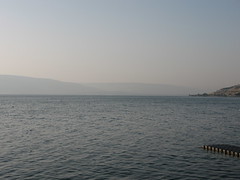 He had mocked us that would have spoken, Be of good cheer. This same but is like a happy oar, that turns our vessel from the rocks of despair, and lands it at the haven of comfort.
He had mocked us that would have spoken, Be of good cheer. This same but is like a happy oar, that turns our vessel from the rocks of despair, and lands it at the haven of comfort.Labels: C H Spurgeon, Psalms, Quotations 0 comments
2008-05-30
Adams on Psalm 58:4
 4 Poison There is such a thing as poison; but where to be found? Ubicunque fuerit, in homine quis quaereret? Wheresoever it is, in man who would look for it? God made man's body of the dust; he mingled no poison with it. He inspires his soul from heaven; he breathes no poison with it. He feeds him with bread; he conveys no poison with it. Unde venenum? Whence is the poison? Mt 13:27 "Didst not thou, O Lord, sow good seed in thy field?" Unde zizaniae — "From whence then hath it tares?" Whence? Hoc fecit inimicus — "The enemy hath done this." We may perceive the devil in it. That great serpent, the red dragon, hath poured into wicked hearts this poison. His own poison, malitiam, wickedness. Cum infundit peccatum, infundit venenum —"When he pours in sin he pours in poison." Sin is poison. Original depravity is called corruption; actual poison. The violence and virulence of this venomous quality comes not at first. Nemo fit repente pessimus — No man becomes worst at the first dash. We are born corrupt, we have made ourselves poisonous. There be three degrees, as it were so may ages, in sin. First — secret sin; an ulcer lying in the bones, but skinned over with hypocrisy. Secondly — open sin, bursting forth into manifest villany. The former is corruption, the second is eruption. Thirdly - frequented and confirmed sin, and that is rank poison, envenoming soul and body.
4 Poison There is such a thing as poison; but where to be found? Ubicunque fuerit, in homine quis quaereret? Wheresoever it is, in man who would look for it? God made man's body of the dust; he mingled no poison with it. He inspires his soul from heaven; he breathes no poison with it. He feeds him with bread; he conveys no poison with it. Unde venenum? Whence is the poison? Mt 13:27 "Didst not thou, O Lord, sow good seed in thy field?" Unde zizaniae — "From whence then hath it tares?" Whence? Hoc fecit inimicus — "The enemy hath done this." We may perceive the devil in it. That great serpent, the red dragon, hath poured into wicked hearts this poison. His own poison, malitiam, wickedness. Cum infundit peccatum, infundit venenum —"When he pours in sin he pours in poison." Sin is poison. Original depravity is called corruption; actual poison. The violence and virulence of this venomous quality comes not at first. Nemo fit repente pessimus — No man becomes worst at the first dash. We are born corrupt, we have made ourselves poisonous. There be three degrees, as it were so may ages, in sin. First — secret sin; an ulcer lying in the bones, but skinned over with hypocrisy. Secondly — open sin, bursting forth into manifest villany. The former is corruption, the second is eruption. Thirdly - frequented and confirmed sin, and that is rank poison, envenoming soul and body.Labels: C H Spurgeon, Psalms, Quotations 0 comments
2008-05-29
Google Books
Books by Adams available on Google Books
Exposition of 2 Peter
Three Divine sisters etc
Labels: 2 Peter, Commentary, Psalms, Publications, Three Divine Sisters 0 comments
Adams on Psalm 50:15, 18, 21
15 Call upon me in the day of trouble, etc The Lord hath promised his children supply of all good things, yet they must use the means of impetration; by prayer. He feed the young ravens when they call upon him. Ps 147:9. He feeds the young ravens, but first they call upon him. God withholds from them that ask not, lest he should give to them that desire not (Augustine). David was confident that by God's power he should spring over a wall; yet not without putting his own strength and agility to it. Those things we pray for, we must work for (Augustine). The carter in Isidore, when his cart was overthrown, would needs have his god Hercules come down from heaven, to help him up with it; but whilst he forbore to set his own shoulder to it, his cart lay still. Abraham was as rich as any of our aldermen, David as valiant as any of our gentlemen, Solomon as wise as any of our deepest naturians, Susanna as fair as any of our painted pieces. Yet none of them thought that their riches, valour, policy, beauty or excellent parts could save them; but they stirred the sparks of grace and bestirred themselves in pious work. And this is our means, if our meaning be to be saved.
Labels: C H Spurgeon, Psalms, Quotations 0 comments
2008-05-28
Adams on Psalm 49:17
Labels: C H Spurgeon, Psalms, Quotations 0 comments
2008-05-19
Adams on Psalm 39:10 & 45:10
Labels: C H Spurgeon, Psalms, Quotations 0 comments
2008-05-08
Adams on Psalm 38:2
 2 Thy hand presseth me sore Not the hand of Egypt or Ashur; then it were hand for hand, a duel of some equality: hand to hand; here forces and stratagems might achieve a victory: but Thy hand. The weight of a man's blow is but weak, according to the force and pulse of his arm; as the princes of Midian answered Gideon, when he bade his son try the dint of his sword upon them; "Rise thou, and fall upon us: for as the man is, so is his strength." Jud 8:21. But "it is a fearful thing to fall into the hands of the living God." Heb 10:31. As Homer called the hands of Jupiter ceirez aeptoi, hands whose praise could not be sufficiently spoken; which some read ceires aaptoii, hands inaccessible, irresistible for strength: all the gods in heaven could not ward a blow of Jupiter's hand. This hand never strikes but for sin; and where sin is mighty his blow is heavy.
2 Thy hand presseth me sore Not the hand of Egypt or Ashur; then it were hand for hand, a duel of some equality: hand to hand; here forces and stratagems might achieve a victory: but Thy hand. The weight of a man's blow is but weak, according to the force and pulse of his arm; as the princes of Midian answered Gideon, when he bade his son try the dint of his sword upon them; "Rise thou, and fall upon us: for as the man is, so is his strength." Jud 8:21. But "it is a fearful thing to fall into the hands of the living God." Heb 10:31. As Homer called the hands of Jupiter ceirez aeptoi, hands whose praise could not be sufficiently spoken; which some read ceires aaptoii, hands inaccessible, irresistible for strength: all the gods in heaven could not ward a blow of Jupiter's hand. This hand never strikes but for sin; and where sin is mighty his blow is heavy.Labels: C H Spurgeon, Psalms, Quotations 0 comments
2008-05-07
Adams on Psalm 37:25, 26, 37
25-26 I have been young, and now am old, yet have I not seen the righteous forsaken, and I never saw his seed begging their bread: Many persons are solicitously perplexed how their children shall do when they are dead; yet they consider not, how God provided for them when they were children. Is the Lord's arm shortened? Did he take thee from thy mothers breasts; and when thy parents forsook thee (as the psalmist saith), became thy Father? And cannot this experienced mercy to thee, persuade thee that he will not forsake thine? Is not "Jesus Christ the same yesterday, and today, and for ever?" "I have been young," saith David, "and now am old; yet have I not seen the righteous forsaken," that is granted, nay, "not his seed begging bread." Many distrustful fathers are so carking for their posterity, that while they live they starve their bodies, and hazard their souls, to leave them rich. To such a father it is said justly, Dives es haeredi, pauper inopsque tibi. Like an over kind hen, he feeds his chickens, and famishes himself. If usury, circumvention, oppression, extortion, can make them rich, they shall not be poor. Their folly is ridiculous; they fear lest their children should be miserable, yet take the only course to make them miserable; for they leave them not so much heirs to their goods as to their evils. They do as certainly inherit their fathers' sins as their lands: "God layeth his iniquity for his children: and his offspring shall want a morsel of bread." Job 21:19 On the contrary, the good man is merciful and lendeth; and his seed is blessed. What the worldling thinks shall make his posterity poor, God saith shall make the good man's rich. The precept gives a promise of mercy to obedience, not confined to the obedient man's self, but extended to his seed, and that even to a thousand generations, Ex 20:6. Trust, then, Christ with thy children; when thy friends shall fail, usury bear no date, oppression be condemned to hell, thyself rotten to the dust, the world itself turned and burned into cinders, still "Jesus Christ is the same, yesterday, today, and forever."
Labels: C H Spurgeon, Psalms, Quotations 0 comments
2008-05-05
Adams on Psalm 35:3, 16
3 Say unto my soul, I am thy salvation
1. If God speak comfort, let hell roar horror.
2. He may speak by his works: actual mercies to us demonstrate that we are in his favour, and shall not be condemned. "By this I know that thou favourest me, because mine enemy doth not triumph over me."
3. He may speak by his Son. "Come unto me, all ye that labour and are heavy laden, and I will give you rest." Mt 11:28.
4. He may speak by his Scripture; this is God's epistle to us, and his letters patent, wherein are granted to us all the privileges of salvation. A universal si quis; "Whosoever believes, and is baptised, shall be saved."
5. He may speak by his ministers, to whom he hath given "the ministry of reconciliation." 2 Cor 5:19.
6. He doth speak this by his Spirit: he "sendeth forth the Spirit of his Son into our hearts, crying, Abba, Father."
Ga 4:6. By all these voices God says to his elect, I am your salvation. ...
Labels: C H Spurgeon, Psalms, Quotations 0 comments
2008-05-01
Adams on Psalm 34:14, 19
Labels: C H Spurgeon, Psalms, Quotations 0 comments
2008-04-28
Adams on Psalm 33:12
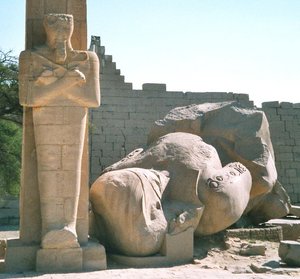 12 Blessed - whom he hath chosen. A man may have his name set down in the chronicles, yet lost; wrought in durable marble, yet perish; set upon a monument equal to a Colossus, yet be ignominious; inscribed on the hospital gates, yet go to hell; written in the front of his own house, yet another come to possess it; all these are but writings in the dust, or upon the waters, where the characters perish so soon as they are made; they no more prove a man happy than the fool could prove Pontius Pilate because his name was written in the Creed. But the true comfort is this, when a man by assurance can conclude with his own soul that his name is written in those eternal leaves of heaven, in the book of God's election, which shall never be wrapped up in the cloudy sheets of darkness but remain legible to all eternity.
12 Blessed - whom he hath chosen. A man may have his name set down in the chronicles, yet lost; wrought in durable marble, yet perish; set upon a monument equal to a Colossus, yet be ignominious; inscribed on the hospital gates, yet go to hell; written in the front of his own house, yet another come to possess it; all these are but writings in the dust, or upon the waters, where the characters perish so soon as they are made; they no more prove a man happy than the fool could prove Pontius Pilate because his name was written in the Creed. But the true comfort is this, when a man by assurance can conclude with his own soul that his name is written in those eternal leaves of heaven, in the book of God's election, which shall never be wrapped up in the cloudy sheets of darkness but remain legible to all eternity.Labels: C H Spurgeon, Psalms, Quotations 0 comments
2008-04-26
Adams on Psalm 32:9
9. Be ye not as the horse, or as the mule, etc. How many run mad of this cause, inordinate and furious lusts! The prophet Jeremiah, Jer 2:24, compares Israel to "a swift dromedary, traversing her ways," and to "a wild ass used to the wilderness, that snuffeth up the wind at her pleasure." Be ye not, said the psalmographer, "as the horse, or as the mule, which have no understanding: whose mouth must be held in with bit and bridle." Men have understanding, not beasts; yet when the frenzy of lust overwhelms their senses, we may take up the word of the prophet and pour it on them: "Every man is a beast by his own knowledge." And therefore "man that is in honour and understandeth not, is like unto beasts that perish" Ps 49:20. Did not the bridle of God's overruling providence restrain their madness, they would cast off the saddle of reason, and kick nature itself in the face.
Labels: C H Spurgeon, Psalms, Quotations 0 comments
2008-04-25
Adams on Psalm 27:4
Labels: C H Spurgeon, Psalms, Quotations 0 comments
Adams on Psalm 26:4,10
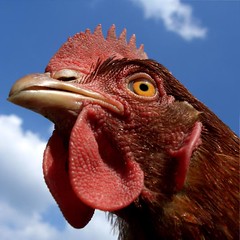 4 Dissemblers. The hypocrite has much angel without, more devil within. He fries in words, freezes in works; speaks by ells, doth good by inches. He is a stinking dunghill, covered over with snow; a loose hung mill that keeps great clacking, but grinds no grist; a lying hen that cackles when she hath not laid.
4 Dissemblers. The hypocrite has much angel without, more devil within. He fries in words, freezes in works; speaks by ells, doth good by inches. He is a stinking dunghill, covered over with snow; a loose hung mill that keeps great clacking, but grinds no grist; a lying hen that cackles when she hath not laid.Labels: C H Spurgeon, Psalms, Quotations 0 comments
2008-04-24
Adams on Psalm 22:16, 20
Labels: C H Spurgeon, Psalms, Quotations 0 comments
2008-04-23
Adams on Psalm 18:38-40 & 19:12
Labels: C H Spurgeon, Psalms, Quotations 0 comments
2008-04-15
Adams on Psalm 15:5
Labels: C H Spurgeon, Psalms, Quotations 0 comments
2008-04-14
Adams on wealth
 All our pieces of gold are but current to the grave; none of them will pass in the future world. Therefore as merchants when they travel make over their monies here, to receive them by bills of exchange in another country; let us do good with our goods while we live, that when we die, by a blessed bill of exchange, we may receive them again in the Kingdom of heaven (Luke 16:9). To part with what we cannot keep, that we may get that we cannot lose, is a good bargain. Wealth can do us no good, unless it help us toward heaven.
All our pieces of gold are but current to the grave; none of them will pass in the future world. Therefore as merchants when they travel make over their monies here, to receive them by bills of exchange in another country; let us do good with our goods while we live, that when we die, by a blessed bill of exchange, we may receive them again in the Kingdom of heaven (Luke 16:9). To part with what we cannot keep, that we may get that we cannot lose, is a good bargain. Wealth can do us no good, unless it help us toward heaven. Labels: Quotations, Wealth 0 comments
2008-04-11
Adams on Psalm 14:1
Labels: Atheism, C H Spurgeon, Psalms, Quotations 0 comments
2008-04-10
Adams on Psalm 12:2 & 13:5
 12:2 They speak with a double heart. The original is, "A heart and a heart:" one for the church, another for the change; one for Sundays, another for working-days; one for the king, another for the pope. A man without a heart is a wonder, but a man with two hearts is a monster. It is said of Judas, "There were many hearts in one man;" and we read of the saints, "There was one heart in many men." Acts 4:32. Dabo illis cor unum; a special blessing.
12:2 They speak with a double heart. The original is, "A heart and a heart:" one for the church, another for the change; one for Sundays, another for working-days; one for the king, another for the pope. A man without a heart is a wonder, but a man with two hearts is a monster. It is said of Judas, "There were many hearts in one man;" and we read of the saints, "There was one heart in many men." Acts 4:32. Dabo illis cor unum; a special blessing.Labels: C H Spurgeon, Psalms, Quotations 0 comments








